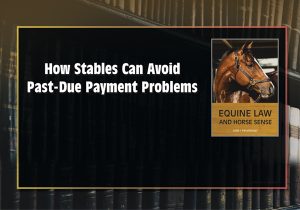How Stables Can Avoid Past-Due Payment Problems
Click here to read the complete article
250 – January/February, 2022
 By Julie I. Fershtman, Attorney at Law · www.equinelaw.net
By Julie I. Fershtman, Attorney at Law · www.equinelaw.net
Operating expenses for stables are tremendous. Utility bills, feed bills, hay costs, labor costs, taxes, insurance, veterinarians, farriers, building maintenance, property maintenance–all of them add up and require operating capital. To keep up with these and other expenses, boarding stables rely on their boarders to pay their fees on time and in full. Unfortunately, stables occasionally encounter problems when boarders fall behind. Although all disputes cannot be prevented, careful advance planning might help prevent problems from occurring.
Before the Boarding Arrangement Begins
Even stables that have never encountered a non-paying boarder have every incentive to plan for the possibility of this happening. Here are two options to consider:
• Use detailed contracts. Boarding contracts can address, in detail, payment responsibilities of the boarder. For example, the contract can include payment deadlines and grace periods (which are a few extra days the stable allows for payments to be received), interest on unpaid balances at a rate allowed under the applicable state’s law, and late payment fees (where allowed by law) that the stable can impose if payments are not received in a timely manner. In addition, stables can learn more about their applicable state’s stablemen’s lien law (also called an “agister’s lien law”) that applies to non-payment situations, and the contract can reference this law. Because of the possibility that stables may need to engage a lawyer to help collect unpaid board, stables can consider including an attorney fee clause through which the stable could potentially recover its legal fees from the non-paying boarder.
• Send timely invoices. Stables can send their clients monthly invoices setting forth the amount due. Sending timely invoices to boarders helps them understand the basis for charges. Invoices also remind boarders of upcoming payment deadlines. Invoices would include basic monthly boarding fees and extra amounts incurred during the prior month for services, such as training, hauling fees, shared barn call fees for the veterinarian, show fees, and others. The boarding contract can include the stable’s current schedule of additional fees and charges that lists these possible fees.
When Problems Start
Click here to read the complete article
250 – January/February, 2022










